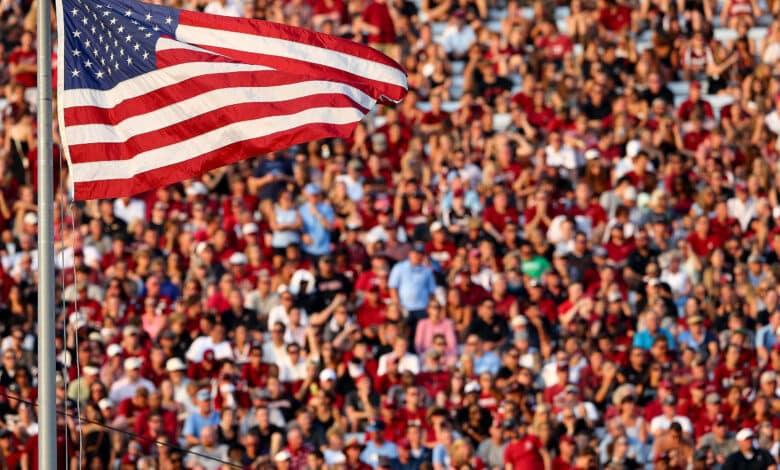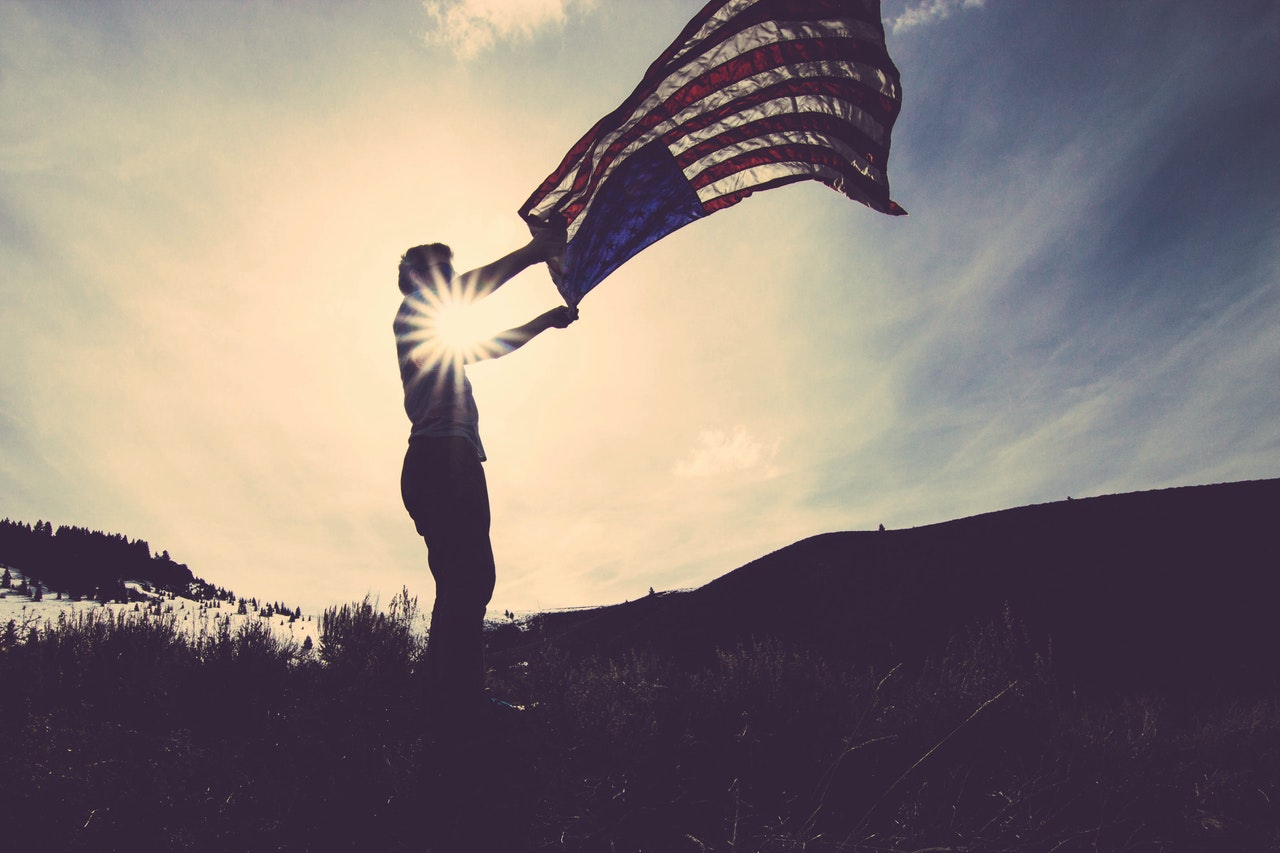Flag Waver Meaning: Uncovering the Symbolism and Significance

A flag waver is someone who shows strong support for a cause, organization, or country. This term often refers to a person who enthusiastically promotes their beliefs or group.
Understanding the meaning of “flag waver” helps us see how people express loyalty. These individuals passionately share their views, inspiring others to join or support their cause. They can be seen at rallies, sporting events, and even online. Their energy and dedication often unite people, creating a sense of community and shared purpose.
In this blog post, we will explore the role of a flag waver, their impact, and why their enthusiasm is so powerful. Join us to learn more about these passionate supporters and what drives them.
Introduction To Flag Waving
Flag waving is an old practice. It carries deep meaning and symbolism. People wave flags at events, protests, and celebrations. Flags represent ideas, nations, and causes. Understanding flag waving helps us appreciate its importance.
Historical Context
Flag waving has a long history. Ancient civilizations used flags in battles. They showed alliances and territories. In medieval times, knights carried flags. These flags displayed family crests and colors. The tradition continued through the ages.
During the American and French revolutions, flags became symbols of freedom. They united people under common causes. Soldiers waved flags to boost morale. These flags told stories of struggle and victory.
Cultural Relevance
Flag waving is significant in many cultures. Sports events often feature flag waving. Fans wave flags to support their teams. National flags are waved during parades and holidays. This shows pride and unity.
Protests and movements use flags to convey messages. They symbolize resistance and demand change. Flags are more than fabric. They carry deep cultural meaning. Understanding this helps us connect with global traditions.

Credit: thesaurus.plus
Symbolism Of Flags
Flags hold deep meaning in every society. They represent ideals, values, and history. A flag can unite people and evoke strong emotions. Understanding the symbolism of flags helps us appreciate their significance.
National Identity
Flags are strong symbols of national identity. They represent a nation’s culture, history, and values. A national flag often includes colors, emblems, and designs that reflect the country’s heritage. For example:
- The stars on the American flag symbolize the 50 states.
- The maple leaf on the Canadian flag stands for nature and peace.
By waving a flag, people show pride in their country. It fosters a sense of belonging and patriotism. The flag becomes a symbol of the nation’s unity and strength.
Unity And Solidarity
Flags also symbolize unity and solidarity. During events, such as sports competitions, people wave flags to show support for their team or country. This act brings people together and creates a sense of community.
In times of crisis, flags can be a beacon of hope and resilience. For instance, after a natural disaster, people may fly their national flag to show they stand strong together.
Flags help to unite people from different backgrounds under a common symbol. They remind us that we are stronger together.
The Role Of Flag Wavers
Flag wavers hold a significant place in many events and communities. They are often seen at parades, sports events, and political rallies. Their presence adds color, energy, and a sense of unity. Flag wavers do more than just wave flags; they inspire and lead. This section will explore the vital roles they play.
Community Leaders
Flag wavers often emerge as community leaders. They inspire pride and unity. They are the ones who lead the charge during national holidays or local celebrations. Their enthusiasm is contagious. It brings people together.
These leaders know the importance of symbols. They wave flags to honor history and heritage. They remind everyone of shared values and goals. Their role is not just about waving a piece of cloth. It is about fostering a sense of belonging.
Event Participants
Flag wavers are crucial event participants. They add excitement and energy to any event. Whether at a sports game or a political rally, they stand out. Their flags are a focal point. They grab attention and raise spirits.
At sports events, they cheer for their team. They wave flags with passion and pride. This boosts team morale and energizes the crowd. At political rallies, their flags represent support for a cause or candidate. They make a visual statement that is hard to ignore.
In parades, flag wavers lead the procession. They set the tone for the event. Their synchronized movements and colorful flags create a captivating spectacle. They make the event more memorable for everyone involved.

Credit: thesaurus.plus
Flag Waving In History
Flags have always been more than just pieces of cloth. They symbolize identity, unity, and purpose. Throughout history, people have waved flags to show solidarity or to rally others to a cause. This act of flag waving has played significant roles in various historical events.
Revolutionary Movements
During revolutionary movements, flags have been symbols of resistance and change. For example, the American Revolution saw the famous Betsy Ross flag. This flag, featuring 13 stars, represented the original colonies united for independence.
In France, the Tricolore became a powerful symbol during the French Revolution. It represented liberty, equality, and fraternity. The sight of this flag inspired many to join the cause against tyranny.
| Revolution | Flag | Symbolism |
|---|---|---|
| American Revolution | Betsy Ross Flag | Unity of 13 colonies |
| French Revolution | Tricolore | Liberty, Equality, Fraternity |
Civil Rights Marches
In the 1960s, the Civil Rights Movement in the United States used flags to unify and inspire. The American flag was often seen in marches, symbolizing the fight for equal rights.
During the famous March on Washington, protesters waved flags to show their commitment to justice. The flags symbolized their hope for a better future.
In addition to the American flag, the Black Power flag also became a symbol of pride and resistance. It represented the fight against racial oppression and the desire for equality.
- American Flag: Fight for equal rights
- Black Power Flag: Pride and resistance
Flag Waving In Modern Times
Flag waving has a rich history. Today, it continues to play a vital role in our society. Flags symbolize unity, pride, and support. Whether at political rallies or sports events, flags hold significant meaning.
Political Rallies
Political rallies are one of the most common places to see flag waving. Supporters of various parties use flags to show allegiance. A flag at a rally can unite people under a common cause.
Flags at political rallies often bear the party’s colors or symbols. This creates a strong visual impact. It helps supporters feel a sense of belonging. Flags can also be used to send messages. For example, a peace flag may be waved at an anti-war protest.
| Political Party | Flag Colors |
|---|---|
| Party A | Red, White |
| Party B | Blue, Yellow |
Sports Events
Flags are also a common sight at sports events. Fans use them to show support for their favorite teams. Waving a flag in the stadium can create an electric atmosphere. It boosts the team’s morale and energizes the crowd.
In international sports, national flags are waved to show pride and support for one’s country. This is especially evident during events like the Olympics. Fans from around the world come together, each waving their own national flags.
- Team Flags
- National Flags
- Event-Specific Flags
Flag waving at sports events is not just for the spectators. Players also take part in this tradition. After a victory, players often wave their team’s flag. This act is a show of triumph and unity.
In summary, flag waving in modern times remains a powerful symbol. It brings people together, whether in political rallies or sports events.
Psychological Impact Of Flag Waving
Flag waving holds deep meaning. It impacts people on a psychological level. This simple act can stir strong emotions. It can also change how groups act together.
Patriotic Emotions
Seeing a flag can make you feel proud. It often brings strong patriotic feelings. A flag reminds people of their country. It can evoke memories of past events. This can make people feel connected to their nation’s history.
During national events, flags play a key role. They are symbols of unity. They represent shared values. Waving a flag can feel like a personal statement. It’s a way to show love for one’s country.
Group Dynamics
Flags affect group behavior. They act as a rallying point. In protests or celebrations, flags lead the way. People follow them. This creates a sense of order and direction.
Flags also help build group identity. When people wave the same flag, they feel united. They feel part of something bigger than themselves. This strengthens group bonds. It can improve cooperation and teamwork.
Controversies Around Flag Waving
Flag waving often sparks heated debates. Some see it as a symbol of pride. Others view it as a divisive act. The meaning behind waving a flag can vary. While it can unite people, it can also cause conflicts.
Nationalism Vs. Patriotism
Nationalism and patriotism are often confused. Patriotism means loving your country. It involves celebrating its achievements. Nationalism, on the other hand, is more intense. It places one nation above all others.
Nationalists may exclude those who are different. They can be aggressive in their pride. This can lead to conflicts with other nations. Patriotic acts are usually inclusive. They celebrate the country’s values and history.
Flag waving can symbolize both. Some wave their flag to show love for their country. Others wave it to assert dominance.
Exclusionary Practices
Flag waving can sometimes exclude people. It can create a sense of “us vs. them”. This can be harmful in diverse societies. People who do not fit the national image may feel alienated.
Exclusionary practices can manifest in various ways:
- Discrimination against minorities
- Mistrust of foreigners
- Hostility towards different cultures
These practices can weaken social bonds. They can lead to tension and conflict. For a society to thrive, it must be inclusive. Flag waving should unite, not divide.

Credit: viaexmachina.com
Frequently Asked Questions
What Does ‘flag Waver’ Mean?
A ‘flag waver’ is a person who shows strong support for their country or cause, often in a demonstrative way.
Is ‘flag Waver’ A Positive Term?
Yes, it can be positive, indicating patriotism and enthusiasm. However, it can also suggest excessive or blind loyalty.
Where Did ‘flag Waver’ Originate?
The term ‘flag waver’ originated from the practice of waving flags to show support, especially during political or national events.
Can ‘flag Waver’ Be Used Negatively?
Yes, ‘flag waver’ can imply someone is overly nationalistic or blindly supportive, without considering different perspectives.
Conclusion
Understanding the term “flag waver” enriches our grasp of patriotic expressions. This term symbolizes strong national pride. Often, it describes enthusiastic supporters of a cause. Recognizing its meaning helps in appreciating cultural contexts. Next time you hear “flag waver,” you’ll know its significance.
Embrace this knowledge to better connect with diverse perspectives. Keep exploring language and culture for deeper insights.





